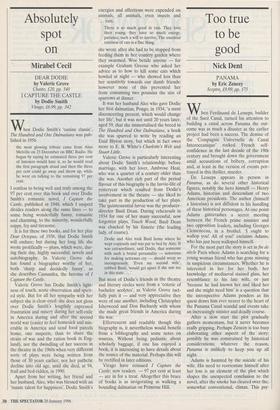Absolutely spot on
Mirabel Cecil
DEAR DODIE by Valerie Grove Chatto, £20, pp. 340 I CAPTURE THE CASTLE by Dodie Smith Virago, £6.99, pp. 342 When Dodie Smith's 'canine classic', The Hundred and One Dalmatians was pub- lished in 1956
the most glowing tribute came from Alan Melville on 23 December on BBC Radio. He began by saying he estimated three per cent of listeners would hate it, so he would read the first paragraph aloud and then the three per cent could go away and throw up, while he went on talking to the remaining 97 per cent.
I confess to being well and truly among the 97 per cent over this book and over Dodie Smith's romantic novel, I Capture the Castle, published in 1948, which I suspect divides readers along the same lines — to some being wonderfully funny, romantic and charming, to the minority, wonderfully soppy, fey and tiresome.
It is for these two books, and for her play Dear Octopus, of 1938, that Dodie Smith will endure; but during her long life she wrote prolifically — plays, which were, dur- ing their day, highly successful; novels and autobiography. In Valerie Grove she has found a biographer worthy of her, both 'sharp and decidedly funny', as she describes Cassandra, the heroine of I Capture the Castle.
Valerie Grove has Dodie Smith's light- ness of touch, acute observation and spirit- ed style. But for all her sympathy with her subject she is clear-eyed: she does not gloss over Dodie Smith's lengthily expressed frustration and misery during her self-exile in America during and after the second world war (easier to feel homesick and mis- erable in America and send food parcels home, one suspects, than to share the strain of war and the ration book in Eng- land), nor the dwindling of her success in the theatre in the 1960s when very different sorts of plays were being written from those of 30 years earlier; nor her pathetic decline into old age, until she died, at 94, frail and bed-ridden, in 1990.
Apart from her writing, her friend and her husband, Alec, who was blessed with an `innate talent for happiness', Dodie Smith's energies and affections were expended on animals, all animals, even insects and . . . rats.
There is so much good in rats. They love their young, they have so much energy, patience, such a will to survive. The essential rattiness of rats is a fine thing,
she wrote after she had to be stopped from feeding them in her country garden where they swarmed. Woe betide anyone — for example Graham Greene who asked her advice as to how to kill some cats which howled at night — who showed less than her sensitivity towards our dumb friends: however none of this prevented her from consuming two poussins the size of sparrows at dinner.
It was her husband Alec who gave Dodie her first dalmatian, Pongo, in 1934, 'a most disconcerting present, which would change her life', but it was not until 20 years later, aged 59, that she immortalised the breed in The Hundred and One Dalmatians, a book she was spurred to write by reading an Enid Blyton story, but which in fact owes more to E. B. White's Charlotte's Web and Stuart Little.
Valerie Grove is particularly interesting about Dodie Smith's relationship, before marriage, with her lover, Ambrose Heal, who was a quarter of a century older than she was. Another rich part of the period flavour of this biography is the luwie-life of yesteryear which resulted from Dodie's involvement in the theatre — she liked to take part in the production of her plays. The quintessential luwie was the producer- director Basil Dean. During rehearsals in 1934 for one of her many successful, now forgotten plays, Touch Wood, Basil Dean was chucked by his fiancée (the leading lady, of course).
Dodie and Alec took Basil home where he wept copiously and was put to bed by Alec. It was extraordinary, said Dodie, that someone with such a brutal personality — notorious for making actresses cry — should weep so incongruously. 'Even my second wife', sobbed Basil, 'would get upset if she saw me in this state....'
But most of Dodie's friends in the theatre and literary circles were from a 'coterie of bachelor acolytes', as Valerie Grove tact- fully puts it — and very appreciative they were of one another, including Christopher Isherwood and Don Bachardy with whom she made great friends in America during the war.
Effervescent and readable though this biography is, it nevertheless would benefit from a bibliography and some notes on sources. Without being pedantic about scholarly baggage, if one has enjoyed a book, it is interesting to have details about the source of the material. Perhaps this will be rectified in later editions.
Virago have reissued I Capture the Castle; new readers — 97 per cent at least — are in for a treat. Altogether this brace of books is as invigorating as walking a bounding dalmatian on Primrose Hill.


























































 Previous page
Previous page